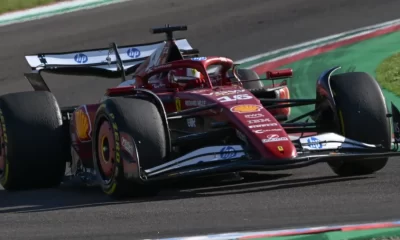Travel
You’ll soon be able to use your phone on EU flights. But passengers aren’t sure that’s a good thing
A new poll has revealed that passengers are split on new inflight phone rules.
Passengers on flights within the European Union (EU) will soon be allowed to use mobile phones without enabling aeroplane mode.
The new rules – outlined by the European Commission last year – will mean travellers can make phone calls, text and stream videos. But not everyone’s happy.
According to new research by Kayak, one-in-five passengers oppose the change.
21 per cent of British respondents are against the ruling, while 40 per cent welcome it but think there should be a limit on usage with a “quiet hours” time on flights.
“A flight can often be seen as dead time… but for some, it’s part of the experience of going on holiday, relaxing and switching off from the world, having a snooze or watching an in-flight movie, which could be interrupted by others using 5G,” said Evan Day, KAYAK UK country manager.
“Let’s hope that people are respectful of those around them to avoid a ruckus on board.”
Why do passengers have to enable aeroplane mode on flights?
The European Commission has ruled that airlines can provide 5G technology onboard in addition to allowing mobile data.
Today (June 30) is the deadline for member states to provide 5G technology on aircraft.
This is a big change – air passengers in the EU are currently requested to turn off mobile phones or enable flight mode for the whole journey.
This is because historically there was little understanding of how mobile data might affect flight communications, Dai Whittingham, chief executive of the UK Flight Safety Committee, told the BBC.
“There was a concern they could interfere with automatic flight control systems,” he said. “What has been found with experience is the risk of interference is very small.”
In the US, concerns have been raised over how 5G frequencies might hamper flight systems and even cause alterations to altitude measurements.
However, this is not a problem in the UK and EU, Whittingham confirmed.
“There is much less prospect of interference,” he said. “We have a different set of frequencies for 5G, and there are lower power settings than those that have been allowed in the US.”
“The travelling public wants 5G,” Whittingham added. “The regulators will open up that possibility, but there will be steps that will be taken to ensure that whatever they do is safe.”
When will airline passengers be able to make phone calls in the EU?
The approval from the European Commission means airlines will soon allow passengers to use mobile phone data on board flights.
This means air passengers will be able to make phone calls, access apps and stream music and videos on flights very soon.
“5G will enable innovative services for people and growth opportunities for European companies,” Thierry Breton, EU Commissioner for the Internal Market, said in a statement.
“The sky is no longer a limit when it comes to possibilities offered by super-fast, high-capacity connectivity,” he said.
Airlines will be able to provide high speed internet with the 5G frequencies, which would allow passengers to download a film in a couple of minutes.
Do flight passengers want to use mobile phones on board?
Although the plan has been hailed as a step forward for plane travel, not everyone is happy.
“Given the way people behave with their phones on all other public transport this is depressing news,” one user wrote on Twitter.
“Yet another reason to hate flying. Imagine being stuck in a seat next to somebody on their phone for hours,” said another.
“There isn’t even a plan for a quiet carriage!“
Some travellers also enjoy having a break from their phones.
“I love that on a plane (and I don’t fly very often) it is totally no contact […] It’s a total switch off,” said one Twitter commenter.
Travel
Brits could soon enjoy shorter passport control queues at EU airports. Here’s why
British holidaymakers will soon be able to use e-gates at more EU airports, the UK government has announced.
It comes as part of negotiations between the UK government and the European Union to finalise a ‘post-Brexit reset deal’.
It means British passport holders will no longer have to wait at manned desks and will instead be allowed to use fast-track e-gates usually reserved for EU or European Economic Area citizens.
EU Relations Minister Nick Thomas-Symonds said this would give British travellers “more time to spend on holiday or work trips […] doing what you want, not being stuck in queues.”
The UK government said the move would end “the dreaded queues at border control.”
UK travellers have to join ‘other nations’ queue at EU airports
Following Brexit, UK citizens forfeited their privileged status when travelling to EU countries.
They now fall into the ‘visa-exempt third-country nationals’ category – the same classification as travellers from dozens of countries, including Australia, Canada, New Zealand and Singapore.
This has meant British travellers must join the ‘other nations’ queue at border control rather than using the expedited EU lanes.
The requirement to check that British travellers meet entry conditions is a significant obstacle to allowing them to use the fast-track lanes.
EU border control has to verify that UK travellers are not in breach of the 90-day stay limit in 180 days and that they have the means to return to their country of origin, i.e. a flight ticket out of the EU.
Frontier officials must also stamp the passenger’s passport.
This change often translates to extended waiting times, especially at busy European airports like Amsterdam Schiphol, Milan Malpensa, and Paris Charles de Gaulle.
Waits exceeding an hour have become commonplace, especially when arriving shortly after large international flights.
These delays affect not only entry into EU countries but also departure, as British travellers must undergo exit checks that sometimes result in missed flights due to lengthy queues.
UK travellers will be able to use e-gates at many European airports
Under the new deal, British travellers will be able to take advantage of the faster e-gate passport checks at many EU airports.
No details have yet been released on when this will be introduced and where, although the BBC reported that British Prime Minister Keir Starmer “has called on all EU members to co-operate without delay.”
Some EU airports will likely allow UK travellers to use existing e-gates reserved for EU citizens, while others may install dedicated ‘third-country national’ e-gates.
The latter are already in place across Italy, including Venice Marco Polo and Rome Fiumicino, as well as at Amsterdam Schiphol and Lisbon.
With this system, once the traveller passes through the gate, there is a brief check by border officials who will also stamp passports.
Brits will use e-gates in all airports after introduction of EES
In addition, the UK government underlined that there will be “no legal barriers to e-gate use for British Nationals travelling to and from European Union Member States after the introduction of the European Union Entry/Exit System [EES].”
The EES is scheduled to come into force in October this year. The system will register non-EU visitors who don’t need a visa digitally, removing the need for physical stamps.
New pet passports will make it easier for Brits to bring pets into EU
The UK government also announced that new pet passports will be introduced as part of the deal.
This means UK cats and dogs will be able to travel “more easily” from the UK into the EU by “eliminating the need for animal health certificates for every trip.”
Travel
Three killed in lightning strike at Cambodia’s Angkor Wat UNESCO temple complex
Three people have been killed and several others injured after they were struck by lightning during a visit to Cambodia’s famous Angkor Wat temple complex.
They group had been seeking shelter around the main temple of the UNESCO site when the lightning strike happened late on Friday afternoon.
Video posted on social media showed two ambulances arriving in the aftermath and onlookers and site officials carrying some of the injured people and helping others out on foot.
Other images showed multiple people being treated in hospital.
The day after the incident, Cambodia’s Minister of Tourism Hout Hak issued a statement telling people to take down online posts about the incident, saying the spreading of “negative information” could harm the country’s tourism sector.
Authorities have released no information about the strike, but an official on Monday, speaking on condition of anonymity due to the sensitivity of the issue, confirmed to the Associated Press that the three people killed were all Cambodian nationals.
The Cambodian Red Cross also posted an update saying it had delivered care packages to the families of two of the victims, a 34-year-old man and a 52-year-old woman.
The Red Cross refused to comment further by phone.
A spokesman for the Angkor Wat site did not respond to requests for comment, nor did a regional health official.
Angkor Wat is Cambodia’s best-known tourist attraction, attracting some 2.5 million visitors annually and is featured prominently on the country’s flag.
UNESCO calls the site, which sprawls across some 400 square kilometres and contains the ruins of Khmer Empire capitals from the 9th to the 15th centuries, one of the most important archaeological sites in Southeast Asia.
Cambodia has been actively developing the area to attract more visitors, including opening a new $1.1 billion (€890 million) Chinese-funded airport in nearby Siem Reap.
Its move to relocate some 10,000 families squatting in the Angkor Wat area to a new settlement has drawn widespread criticism from human rights groups and UNESCO itself has also expressed concern.
Cambodian authorities have said the families are being voluntarily relocated, but Amnesty International and other groups have questioned how voluntary those relocations have been.
Travel
‘Leave them where they belong’: Bruges implores tourists to stop stealing cobblestones
Tourists have been caught smuggling all kinds of stolen souvenirs home from holidays, from artefacts picked up in Pompeii to sand from Italy’s famous pink beach on the island of Sardinia.
The Belgian city of Bruges is the latest victim of keepsake crime, but the item visitors have taken a fancy to is unexpected.
The city council has reported the theft of dozens of cobblestones from the city centre, and suspects tourists are the culprits.
Tourists suspected of pilfering Bruges’ cobblestones
Bruges’ cobblestones are increasingly being pilfered from well-known spots in the UNESCO-designated historic centre, public property councillor Franky Demon reported this week.
“At iconic locations such as Minnewater, Vismarkt, Markt and Gruuthusemuseum, it is estimated that 50 to 70 pieces of cobblestone disappear every month. And that number could be even higher,” Demon told press.
“The phenomenon increases significantly, especially during busy tourist periods such as spring and summer,” he added.
For this reason, authorities suspect visitors are pocketing the stone as souvenirs.
‘Leave that cobblestone where it belongs’
As well as damaging a valuable part of the city’s heritage, the stolen stones have created safety issues.
The gaps from removed stones present trip hazards for pedestrians – and are costly to repair.
“It’s unfortunate that our employees constantly have to go out to fix potholes and loose stones. This causes a lot of additional work and costs: about 200 euros per square metre of reconstruction,” explained Demon.
The councillor urged visitors to respect the historical environment of Bruges.
“We simply ask for respect. Anyone walking through Bruges crosses centuries of history. Leave that cobblestone where it belongs,” he said.
Bruges’ cobblestones are apparently not the only sought-after street souvenir.
Along the famous Paris-Roubaix cycling route, tourists are known to pilfer parts of the pavement.
While Rome’s iconic ‘sampietrini’ – cobblestones made of solidified lava – have also disappeared into suitcases over the years.
-

 EU & the World6 days ago
EU & the World6 days agoWho Is Valeria Marquez? About the Influencer Who Was Shot During Livestream
-

 EU & the World3 days ago
EU & the World3 days agoChris Brown Tour 2025: Updates on Concert Dates, Cities, Ticket Prices & More
-

 EU & the World7 days ago
EU & the World7 days agoCardi B & Offset’s Relationship Timeline: From Marriage To Cheating Drama & Split
-

 EU & the World5 days ago
EU & the World5 days agoWho Is Ben Cohen? About the Ben & Jerry’s Co-Founder Who Was Arrested During Senate Hearing
-

 EU & the World2 days ago
EU & the World2 days agoJosh Freese: 5 Things to Know About the Former Foo Fighters Drummer
-
Travel6 days ago
Crete earthquake: Is it safe to travel to the Greek island following tsunami warning?
-

 Sports4 days ago
Sports4 days agoFerrari, opposing views after first day at Imola for Charles Leclerc and Lewis Hamilton
-

 Entertainment3 days ago
Entertainment3 days agoEurovision 2025: Music, Politics, and the Final 26 Set Amid Controversy and Spectacle









